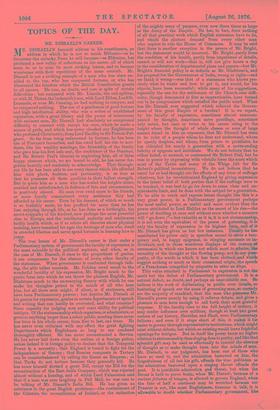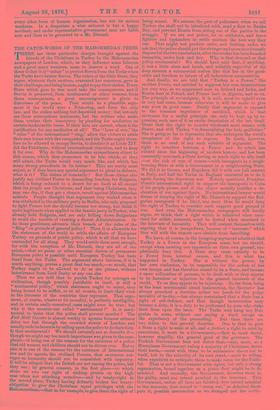TOPICS OF THE DAY.
MR. DISRAELI'S CAREER.
MR. DISRAELI'S farewell address to his constituents, an address in which he is not so much Miltonic—as he threatens the unlucky Peers he will become—as Eldonian, has produced a new volley of reflections on his career, all of which seem to us to miss its most striking lesson, and to become wearisome with their repetitions of the same untruth. Mr. Disraeli is not a striking example of a man who has risen un- aided to the top, who has conquered fortune, or who has illustrated the freedom which the British Constitution grants to all careers. He rose, no doubt, and rose in spite of certain difficulties ; but compared with Mr. Lincoln, the rail-splitter,
or with M. Thiers, the locksmith's son, with Lord Eldon, Lord St. Leonards, or even Mr. Canning, he had nothing to conquer, and he conquered nothing. The son of a gentleman of good fortune and high intellectual ability, who was a writer of established reputation, with a great library and the power of intercourse with eminent men, Mr. Disraeli had absolutely no exceptional difficulty to contend with except his race, which he made a source of pride, and which has never checked any Englishman who professed Christianity, from Lord Eardley to Sir Francis Pal- grave. So far from being unfavoured by fortune, he has been one of Fortune's favourites, and has owed half his rise to acci- dents, like his wealthy marriage, the friendship of the family who gave him his first safe seat, the confidence of the Stanleys, and Sir Robert Peel's blunder in neglecting him, all of them happy chances which, we are bound to add, he has never for- gotten heartily and resolutely to acknowledge. That through- out life he has been able to use every chance which life afforded him with pluck, decision, and pertinacity, is as true as that he possesses all those qualities in their fullest strength. But to quote him as a man who has scaled the heights alone, unaided and unbefriended, in defiance of fate and circumstance, is positively absurd. No man ever owed more to his friends, or more loyally remembered every assistance they had afforded to his career. Even by his descent, of which so much is so foolishly made, he has profited far more than he has lost, enjoying through life, as he has done as a birthright, the secret sympathy of his kindred, now perhaps the most powerful clan in Europe, and the intellectual audacity and continuous bodily health which, as if to refute all theories about physical training, have remained for ages the heritage of men who dwell in crowded Ghettos and never spend fortunes in learning how to jump.
The true lesson of Mr. Disraeli's career is that under a
Parliamentary system of government the faculty of expression is the most valuable to the political aspirant, and when, as in the case of Mr. Disraeli, it rises to the proportions of genius, it can compensate for the absence of every other, faculty of the statesman. When government is conducted through talk- ing, the able talker succeeds. Mr. Cobden owed much to the wonderful lucidity of his expression, Mr. Bright much to the poetic form into which he can throw the plainest English, Mr. Gladstone much to the unwearying fluency with which he can make his thoughts patent to the minds of all who hear him, but all these men might, if silent, or if stutterers, still have been Parliamentary powers ; but deprive Mr. Disraeli of his genius for expression, genius in certain departments of speech and writing that can hardly be overrated, and what remains Some capacity for judging men and some ability for political intrigue. Of the statesmanship which organises, or administers, or governs anything larger than a select public meeting there never has been in his whole career, from first to last, one trace. He has never even criticised with any effect the great fighting Departments which Englishmen so long to see rendered thoroughly efficient. He has never reconstructed a Service. He has never laid down even the outline of a foreign policy, unless indeed it is foreign policy to declare that the Temporal Power is a necessity ; that England is bound to fight for the
independence of Saxony ; that Russian conquests in Tartary can be counterbalanced by calling the Queen an Empress ; or that Turks do not torture because they generally kill. He has never himself devised a great Bill, except the Bill for the reconstruction of the East India Company, which was rejected almost without a hearing, and of which Lord Palmerston said
that if a man was seen laughing in Pall Mall, he was sure to be talking of Mr. Disraeli's India Bill. He has given no assistance to the great English problems,—the contentment of the Colonies, the reconciliation of Ireland, or the extinction of the mighty army of paupers, even now three times as large. as the Army of the Empire. He has, in fact, done nothing of all that practical work which English statesmen have to do, and which the electors demand from every other man who aspires to rule the House of Commons. It may be said that there is another exception in the person of Mr. Bright, but the statement would be incorrect. Mr. Bright, partly from, the condition of his health, partly from impatience of details, cannot or will not work—that is, Will not give hours a day to the consideration of departmental plans and papers—but Mr. Bright's financial policy is as definite as Mr. Gladstone's, and his proposal for the Government of India, wrong or right—and we think it wrong—was that of a statesman who knows pre- cisely what he wants and how to get it, and would, for his objects, have been successful ; while many of his suggestions, especially the one for the settlement of the Church-rate diffi- culty, though denounced at first as impracticable, have turned out to be compromises which satisfied the public mind. What has Mr. Disraeli ever suggested which relieved the Govern- ment of this great Empire of a burden ? It is, we repeat, by his faculty of expression, sometimes almost unaccom- panied by thought, sometimes mere persiflage, sometimes only satire, but once or twice in his career rising to the. height where the thought of whole classes or even of large masses found in him an exponent, that Mr. Disraeli has risen to be ruler of a people whom he does not understand, whom he openly despises, and whom, from prince to proletaire, he has ridiculed for nearly a generation with a never-ending felicity of epigram and antithesis. We do not believe that he either hated, or scorned, or contemned Sir Robert Peel, but he rose to power by expressing with vitriolic force the scorn which most of the Tories and many of the Whigs felt for Sir Robert's political inconsistency. We do not believe that he cared for or had thought out the effects of any form of suffrage whatever, but he revolutionised England by giving expression to the latent belief of both parties that if the suffrage were to be touched, it was best to go far down to some clear and un- mistakable limit, and be done with the subject for a generation. To be able to catch and express latent thought like this is a very great power, in a Parliamentary government perhaps. the most useful power, as useful and more evident than the power attributed to Lord Halifax as the secret of his rise—the power of deciding at once and without error whether a measure will "go down ;"—but valuable as it is, it is not statesmanship, it is not even the equivalent of the power of governing, it is only the faculty of expression in its highest form, and of it Mr. Disraeli has given us but few instances. Usually he has manifested his power only in speeches meant to serve a tem- porary end, in happy epigrams, in stinging sarcasms on in- dividuals, and in those wondrous displays of the oratory of ceremonial in which one knows not which most to admire, the unreality of the thought or the flowing pomp, not to say pom- posity, of the words in which it has been clothed, and which suggest nothing so much as their occasional origin, the speech. of a Frenchman compelled by etiquette to utter an liege.
This value attached in Parliament to expression is not the ' merit but the defect of Parliamentary government. It is a natural defect, no doubt, and perhaps an unavoidable one. Bo tedious is the work of deliberating in public over details, so hesitating of speech are the mass of governing men, so unready are the majority of mankind, that the man who possesses Mr. Disraeli's power merely by using it relieves debate, and gives a pleasure to men keen enough to call forth their most grateful response. If the faculty rises to the full height of oratory, it may confer influence over millions, though at least two great orators of our history, Sheridan and Shell, were Parliamentary failures ; and even if it stops short of this, it makes it far easier to govern through representative institutions, which might exist without debate, but which so existing would leave frightful openings for intrigue. But in itself the power bears no higher relation to statesmanship than singing does to poetry, and like that splendid gift may be used as effectually to conceal the absence of thought as to make thought burn into the minds of men. Mr. Disraeli, in our judgment, has been one of those who have so used it, and the admiration bestowed on him, the forgetfulness of all but his gift, offends the true politician as the admiration bestowed upon a singing throat offends the poet. It is justifiable admiration qud throat, but when the throat is held to prove brain, when Mr. Disraeli, because of a curiosa felicitas of tongue, is allowed to govern England, when the fate of half a continent may be wretched because our Premier is not, like most Englishmen, tiresome in talk, it is allowable to doubt whether Parliamentary government, like
every other form of human organisation, has not its serious being armed. We assume the part of policemen when we tell i weakness. In a despotism a wise autocrat s but a happy [ Turkey she shall not be interfered with, send a fleet to Besika accident, and under representative government men are liable now and then to be governed by a Mr. Disraeli.



































 Previous page
Previous page